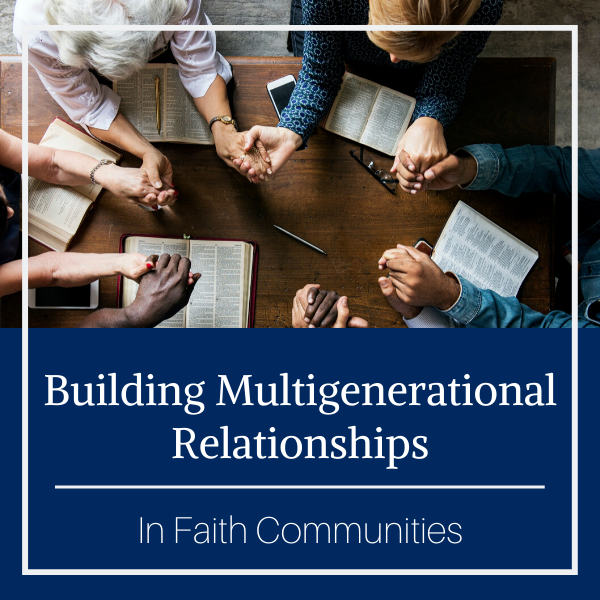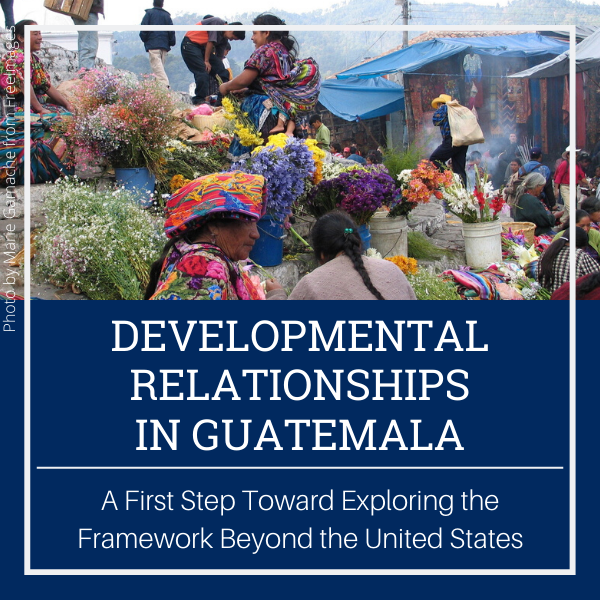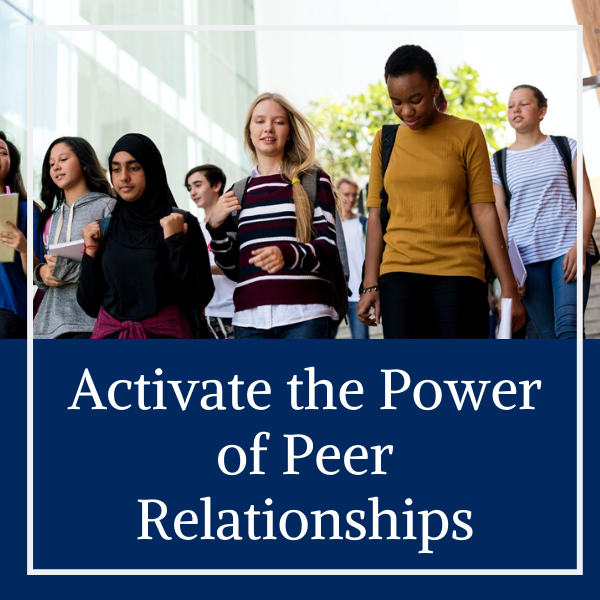Blog
Building Multi-Generational Relationships in Faith Communities
By Clare Eisenberg, Research Associate at Search Institute
As one of the few places where multiple generations from different families gather together (Azzopardi, 2018), faith communities are unique settings for relationship building. Plenty of scholars have suggested that these relationships instill stronger faith in young people, ensure continued engagement in the congregation, or provide supports for families (e.g., Roberto 2007, Melton 2008).
Generally missing from these discussions, however, are the voices of young people and documentation of the positive outcomes of multigenerational relationships that extend much further than the church, synagogue, or masjid walls.
Search Institute is finishing a multi-year study on faith-nurturing relationships within a diverse group of 13 Christian, Jewish, and Muslim congregations in Minnesota and North Carolina. This qualitative study explored the ways young people experience developmental relationships in their congregations. (See box below for more details on the study.).
The 82 youth participants, ages 8 to 19, reported experiencing developmental relationships in their congregations with adults, elders, and peers in a variety of roles including mentors, clergy, youth staff, other congregants, and family members. Youth made it clear that these developmental relationships not not only impacted their faith formation and retention. The relationships also made it easier for them to talk about faith with others, feel more confident and capable, make more choices aligned with their values, and have a stronger sense of agency as well as a deeper awareness of themselves in relation to others.
But perhaps most importantly, young people reported enjoying and appreciating the opportunities for multi-generational experiences and relationship-building in their congregations. In other words, not only do young people grow and develop through intergenerational relationships, they value and seek out these relationships.
“I like talking to youth, I like trusting and talking to the youth leaders. I like learning from the actual adults, and I like watching the childlike faith from the children.” –Youth Participant
“Youth-friendly adults” and “adult-friendly youth”
Youth experienced faith-nurturing developmental relationships with a wide range of adults, elders, and youth within their congregations. Some of these “youth-friendly adults” had specific roles with youth, such as youth-facing clergy and staff, or volunteer mentors in the congregation. Others were congregation staff, family members, and people of all ages within the congregation. Youth reported developmental relationships in their congregations with pastoral or congregational care staff, friends’ parents, and even “the woman who sits behind us.” (Many youth also named their peers as people with whom they have faith-nurturing developmental relationships.)
Although adults—particularly those with formal roles—are often seen as the initiators of youth-adult relationships, these relationships are bi-directional. These adults are “youth-friendly adults,” and the adults also expressed their appreciation for getting to know all the “adult-friendly youth.”
“We have grandparents and the older people, we have parents and those who mentor us, and we have those who help along, who are younger than you, and who are less far along in their faith.” –Youth Participant
How do youth build multigenerational relationships in congregations?
“I talk to people who are eighty or so, and I talk to people way younger than me. I talk to everybody. It’s like a family!” –Youth Participant
Informal fellowship time
Youth often have opportunities to build relationships with people of different generations during informal fellowship time. Many spoke about meals together with the congregation community. One youth explained that although they are “different ages, different backgrounds, different everything,” their shared faith provides “something to talk about and connect with” over meals. Another explained they hope “the older people in the community can bond with the teens” more often and that the elders could share stories and experiences from their younger days.
Intergenerational worship and holiday celebrations
Many youth brought up celebrating holidays as an important part of their religious experience. One young person shared that attending iftar dinner during Ramadan was an opportunity to build relationships with people of all ages in their masjid, because everyone comes together to break their fast. Other young people provided examples of youth-focused worship services and youth-led worship services attended by all ages as ways congregants connected across age. One congregation also provided multigenerational religious education courses open to people of all ages, encouraging youth and adults to learn together.
Family experiences
Participants shared examples of family-focused experiences through their congregations. These gatherings of multiple families allowed youth to get to know adults in the congregation outside of their own families, or as one youth put it, “it’s basically forming a relationship with everybody.” Jewish youth specifically shared experiences with their chavurah, close-knit groups of family friends formed through their synagogues. These groups got together for meals, holidays, and other events outside the synagogue and also traveled together. One young person explained that traveling to Israel with their chavurah was “a really cool bonding experience” because they “got to bond with the parents and the grandparents and the kids.”
So, what can congregations (and other multigenerational youth-serving spaces) do to encourage intergenerational faith-nurturing developmental relationships among congregants?
This emerging research reinforces the case for intentional multigenerational relationship-building in congregations. Young people’s voices extend the importance of these relationships and offer some additional starting points:
- Emphasize bi-directionality. Relationships happen between two or more people – encourage youth to be “adult-friendly” and adults to be “youth-friendly.” Shift from a culture that has adults acting to or for youth to a culture that has youth and adults engaging with one another as equal contributors to the relationship.
- Be intentional in making space and time for relationships. Create opportunities where multiple generations come together for fellowship, worship, celebration, service, and conversation. Encourage intergenerational storytelling and connecting.
- Value youth voice. Give young people leadership roles, listen to their opinions and act on their feedback, and recognize them as active members of the congregation community.
- Think outside the youth program box. Include all adults and all youth in efforts to build intergenerational relationships, within and outside of youth programs. Remind adults that regardless of their role, young people in the congregation value interacting with them. Remind youth that even if they do not participate in youth programming, they can seek out relationships with adults in the congregation.
“We underestimate our role and our influence in the roles of young people and their faith formation. Whether or not we think we’re involved, they’re watching and listening and paying attention to what we’re paying attention to. I think that that has been eye-opening to me and a reminder that what I do matters and what I say matters and how I interact with each one of them, it really matters.” –Adult Participant
- Evaluate existing programming. Is the programming age-specific for a reason, or just because “that’s how it’s done”? Are any age groups left out of programming? Consider expanding age-specific programs to include multiple ages wherever appropriate.
We know developmental relationships are critical to youth development and lead to a wide range of outcomes (e.g., Li and Julian 2012; Roehlkepartain, Pekel, Syvertsen, Sethi, Sullivan, & Scales 2017). This emerging research demonstrates that developmental relationships in faith communities are no exception, and intergenerational faith-nurturing relationships help young people (and adults) thrive both within and outside of their congregations.
Background on the Study
Eighty-two youth between the ages of 9 and 19 participated in focus groups or interviews. Youth participants were asked:
- Who were people in their lives with whom they had a positive relationship and who impacted their faith formation or spirituality?
- How did these people demonstrate in some way the elements of the Developmental Relationships Framework?
- How had they themselves changed or grown as a result of these developmental relationships?
- What experiences had they had as part of the congregation?
Parenting adults, congregation lay leaders, and “relational exemplars” identified by youth also participated in interviews and focus groups to provide their perspectives on these topics. This project is supported by the Lilly Endowment. The complete results of the study will be released in the fall of 2020.
References
Azzopardi, J. (2018). Well-being, discipleship and intergenerational connectedness. In H. Catterton Allen (Ed.). InterGenerate: Transforming churches through intergenerational ministry (pp. 141-149). Abilene, TX: Abilene Christian University Press.
Benson, P. L., Scales, P. C., Hamilton, S. F., Sesma Jr, A., Hong, K. L., & Roehlkepartain, E. C. (2006). Positive youth development so far: Core hypotheses and their implications for policy and practice. Search Institute Insights & Evidence, 3(1), 1-13.
Melton, G. B., & Anderson, D. (2008). From safe sanctuaries to strong communities: The role of communities of faith in child protection. Family & Community Health, 31(2), 173-185.
Li, J., & Julian, M. M. (2012). Developmental relationships as the active ingredient: A unifying working hypothesis of “what works” across intervention settings. American journal of orthopsychiatry, 82(2), 157.
Roberto, J. (2007). Best practices in intergenerational faith formation. Lifelong Faith, 1(3/4), 1-16.
Roberto, J. (2014). Generations Together: A Vision of an Intergenerational Church. Amidei, K. Merhaut, J. & Roberto, J. Generations Together: Caring, Praying, Learning, Celebrating and Serving Faithfully. Minneapolis: Search Institute.
Roberto, J. (2012). Our future is intergenerational. Christian Education Journal, 9(1), 105-120.
Roehlkepartain, E. C., Pekel, K., Syvertsen, A. K., Sethi, J., Sullivan, T. K., & Scales, P. C. (2017). Relationships first: Creating connections that help young people thrive. Minneapolis, MN: Search Institute, 1-20.





